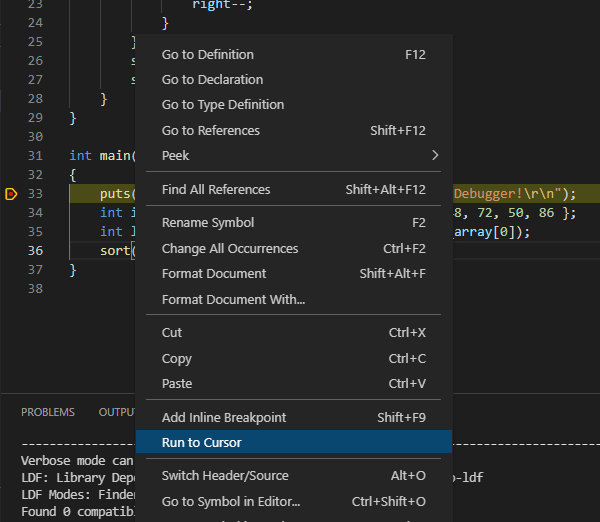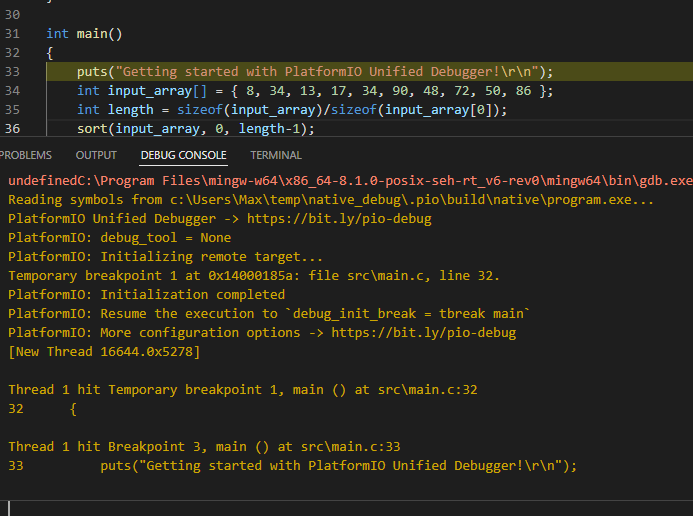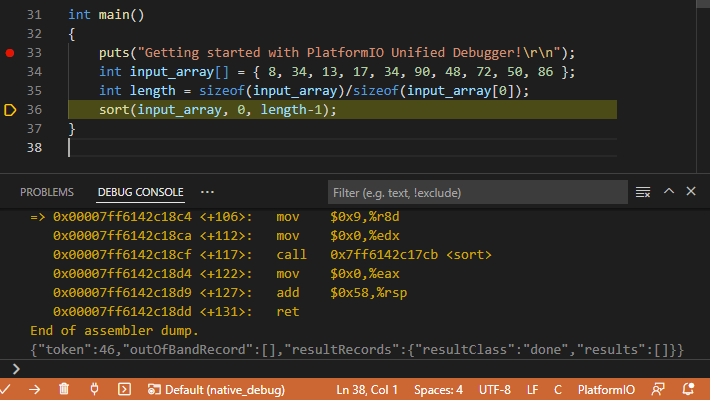There’s only “Run to cursor” when you right click on a line of code while debugging.
I think VSCode doesn’t expose a “Force execution to start here” thing because as Microsoft says,
Moving the next statement to another function or scope usually causes call-stack corruption
So only expert users will want to use this in extremely rare cases.
However, since you do have access to the GDB console through the “Debug Console” Tab…
… you can tell GDB to modify the register responsible for the program counter which is exposed as $pcin GDB. (real register is EIP / RIP on x86/x64, PC on ARM etc…) to a specific address, which itself can be found through disas <function name> commands.
E.g., given the code above and state above, and I want to move to beginning of the “sort” call, I use
=> 0x00007ff6142c1863 <+9>: lea 0x37e6(%rip),%rcx # 0x7ff6142c5050
0x00007ff6142c186a <+16>: call 0x7ff6142c2ee0 <puts>
0x00007ff6142c186f <+21>: movl $0x8,0x20(%rsp)
0x00007ff6142c1877 <+29>: movl $0x22,0x24(%rsp)
0x00007ff6142c187f <+37>: movl $0xd,0x28(%rsp)
0x00007ff6142c1887 <+45>: movl $0x11,0x2c(%rsp)
0x00007ff6142c188f <+53>: movl $0x22,0x30(%rsp)
0x00007ff6142c1897 <+61>: movl $0x5a,0x34(%rsp)
0x00007ff6142c189f <+69>: movl $0x30,0x38(%rsp)
0x00007ff6142c18a7 <+77>: movl $0x48,0x3c(%rsp)
0x00007ff6142c18af <+85>: movl $0x32,0x40(%rsp)
0x00007ff6142c18b7 <+93>: movl $0x56,0x44(%rsp)
0x00007ff6142c18bf <+101>: lea 0x20(%rsp),%rcx
0x00007ff6142c18c4 <+106>: mov $0x9,%r8d
0x00007ff6142c18ca <+112>: mov $0x0,%edx
0x00007ff6142c18cf <+117>: call 0x7ff6142c17cb <sort>
0x00007ff6142c18d4 <+122>: mov $0x0,%eax
0x00007ff6142c18d9 <+127>: add $0x58,%rsp
0x00007ff6142c18dd <+131>: ret
End of assembler dump.
then recognize that the call to sort starts with preparing the registers used for storing the argument values at 0x00007ff6142c18bf, and thus do
0x00007ff6142c1863 <+9>: lea 0x37e6(%rip),%rcx # 0x7ff6142c5050
0x00007ff6142c186a <+16>: call 0x7ff6142c2ee0 <puts>
0x00007ff6142c186f <+21>: movl $0x8,0x20(%rsp)
0x00007ff6142c1877 <+29>: movl $0x22,0x24(%rsp)
0x00007ff6142c187f <+37>: movl $0xd,0x28(%rsp)
0x00007ff6142c1887 <+45>: movl $0x11,0x2c(%rsp)
0x00007ff6142c188f <+53>: movl $0x22,0x30(%rsp)
0x00007ff6142c1897 <+61>: movl $0x5a,0x34(%rsp)
0x00007ff6142c189f <+69>: movl $0x30,0x38(%rsp)
0x00007ff6142c18a7 <+77>: movl $0x48,0x3c(%rsp)
0x00007ff6142c18af <+85>: movl $0x32,0x40(%rsp)
0x00007ff6142c18b7 <+93>: movl $0x56,0x44(%rsp)
0x00007ff6142c18bf <+101>: lea 0x20(%rsp),%rcx
=> 0x00007ff6142c18c4 <+106>: mov $0x9,%r8d
0x00007ff6142c18ca <+112>: mov $0x0,%edx
0x00007ff6142c18cf <+117>: call 0x7ff6142c17cb <sort>
0x00007ff6142c18d4 <+122>: mov $0x0,%eax
0x00007ff6142c18d9 <+127>: add $0x58,%rsp
0x00007ff6142c18dd <+131>: ret
End of assembler dump.
and the line was changed and one instruction was executed, which is reflected again in the GUI.
Of course in this case, the initialization of the array input_array on the stack was skipped (movl $0x8,0x20(%rsp) etc. instructions), so the function will run on completely random data from the stack. But, that’s exactly what forcing the next statement address causes in this case.


